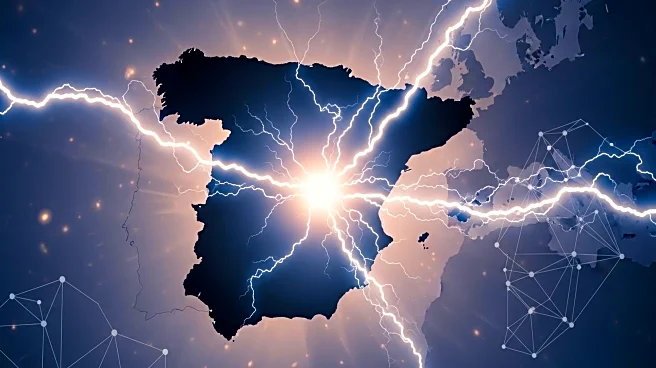What's Happening?
A report by the European network of electricity transmission system operators has identified excessive voltage as the cause of a massive power outage that affected the Iberian Peninsula in April. This blackout, the most significant in Europe in over two decades, disrupted cities and stranded train passengers across Spain and Portugal. The report, released ahead of an October 28 legal deadline, focused on the condition of power systems on the day of the outage and the sequence of events, but did not delve into the initial trigger. The investigation found no evidence of a cyber-attack and noted that Spain's reliance on renewable energy and limited power interconnections did not contribute to the blackout. The Spanish and Portuguese governments have since advocated for the EU to assist in developing new power links to better manage future disruptions.
Why It's Important?
The identification of excessive voltage as the cause of the Iberian blackout highlights vulnerabilities in Europe's power infrastructure, particularly in Spain and Portugal. This event underscores the need for improved voltage control systems and better interconnection capacity to prevent similar occurrences. The blackout's impact on daily life and economic activities in the region demonstrates the critical importance of reliable energy systems. The findings may influence future energy policies and infrastructure investments in Europe, as governments seek to enhance grid resilience and prevent widespread disruptions. Stakeholders, including power utilities and grid operators, are likely to face increased scrutiny and pressure to implement effective voltage management strategies.
What's Next?
A final report is expected in the first quarter of 2026, which will investigate the root causes of the blackout and the measures taken to control voltage in the system. The Spanish and Portuguese governments are likely to continue lobbying for EU support in developing new power links, which could lead to significant infrastructure projects aimed at enhancing grid connectivity. The ongoing investigations by national energy watchdogs and lawmakers may result in policy changes or regulatory actions to address the identified vulnerabilities. Power utilities and grid operators may need to collaborate on improving data collection and voltage control systems to prevent future outages.
Beyond the Headlines
The blackout raises questions about the adequacy of current energy infrastructure in handling unexpected surges and the role of renewable energy in grid stability. The event may prompt a reevaluation of energy strategies, including the balance between conventional and renewable sources, and the importance of cross-border energy cooperation. The incident also highlights the challenges of data collection and transparency in energy investigations, which could lead to calls for improved monitoring and reporting standards.









